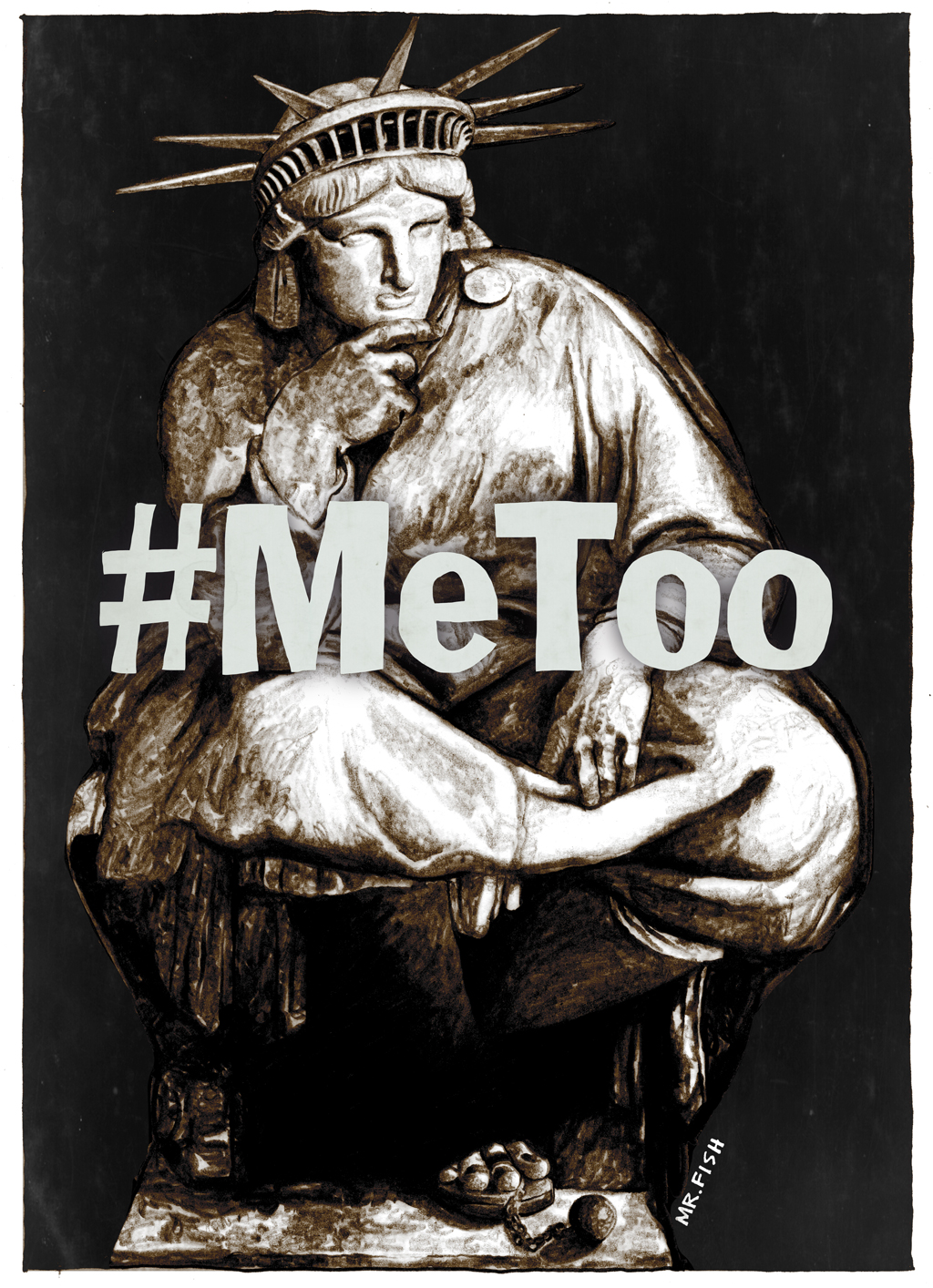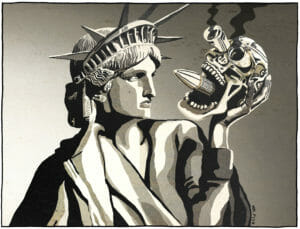#MeToo Gains Steam as France Considers Catcall Ban
A hashtag with roots in a movement started 10 years ago has reignited a much-needed conversation on sexual harassment, in the U.S. and abroad. The above response by Truthdig cartoonist Mr. Fish highlights how patriarchy undermines democracy and weakens justice. (Mr. Fish / Truthdig)
The above response by Truthdig cartoonist Mr. Fish highlights how patriarchy undermines democracy and weakens justice. (Mr. Fish / Truthdig)
In the wake of the many abuse allegations coming to light involving Hollywood producer Harvey Weinstein, an online conversation has been sparked under #MeToo. Started by activist Tarana Burke nearly 10 years ago, the hashtag began to trend over the weekend after actress Alyssa Milano tweeted a screen shot of Burke’s idea.
In an era when even the leader of the United States has been accused by several women of sexual assault, the conversation around the issue seems to have taken on a new urgency. Reminiscent of the #YesAllWomen movement that formed online in 2014, #MeToo highlights the prevalence of sexual violence and attempts to create solidarity in order to help survivors in their healing process.
There has been some criticism of the trend, such as the following Vice piece by Megan Nolan titled “The Problem with the #MeToo Campaign.”
The problem, really, with all of it is how violently present the victim is forced to be in the narrative, and how utterly passive the perpetrator. The problem is not that women have trouble considering themselves victims of sexual violence, but that men have trouble considering themselves the aggressor. Indeed, it is difficult for all of us to accept how many of the men we know that may have committed acts of sexual aggression. This is why the words “witch hunt” get bandied around at times like this because it does seem crazy when you start pointing it all out; it seems beyond belief really, that so many men are implicated. Because people conflate sexual violence with evil, they don’t identify themselves, or their friends, as part of the problem. Because these acts are specific and contextual, and not always as cinematic as we expect them to be. And there are reasons why they happen, little justifications and excuses to be fed to ourselves. There are always reasons.
Awareness of the scale of abuse does not address these problems. The simple fact is, I have no idea how to address them. They are unimaginably ingrained in the foundations of our society. The condition of being sexually oppressed is the condition of womanhood itself. I don’t spend my day-to-day existence considering my sexual trauma or being afraid. But nonetheless, the climate of sexual oppression shaped the basic building blocks of who I came to be, and what happened to me. There is no person unaffected by patriarchal sexual oppression because the culture itself is built upon it.
In the real world, where we live, it is, of course, necessary to take practical steps to prevent attacks and to enable reporting to ensure abusers face appropriate punitive measures both legal and social. These things make a tangible difference to the lives of women.
In France, #MeToo prompted not only another trending hashtag, #BalanceTonPorc, meaning “Expose Your Pig,” but also legal ramifications as the nation considers fining the act of catcalling, following in the footsteps of other European countries, such as Portugal and Belgium, that already have penalties in place for verbal sexual harassment.
In France, … where a chauvinistic culture has long enabled powerful men to misbehave with impunity, the social media debate may push forward changes not only in the culture but in the law.
Proposals are under discussion to fine men for aggressive catcalling or lecherous behavior toward women in public, to extend the statute of limitations in cases of sexual assault involving minors, and to create a new age ceiling under which minors cannot legally consent to a sexual relationship.
Marlène Schiappa, a feminist and writer who is France’s junior minister for gender equality, said on Monday that the government was considering precisely how to define street harassment and how much to fine. The government would consult legal professionals on its proposals and hold workshops for citizens across the country, she said, aiming to put measures before Parliament next year.
[Sandrine Rousseau, a former leader of the French Green Party and leading advocate for victims of sexual harassment] said “Expose Your Pig” was a good start, but words needed to be translated into action and successful legal cases remained rare. According to a 2016 study by Ifop, a leading pollster, just 65 of the 1,048 sexual harassment lawsuits in France in 2014 led to a conviction.
Another response to #MeToo has been the trend #HowIWillChange, started by writer Benjamin Law:
Guys, it’s our turn.
After yesterday’s endless #MeToo stories of women being abused, assaulted and harassed, today we say #HowIWillChange.
— Benjamin Law ? (@mrbenjaminlaw) October 16, 2017
Elle UK online has posted several of the most powerful responses that fell under this hashtag in which men attempted to show solidarity with women and also recognize how they benefit from a patriarchal system that is based on the abuse of women’s, and thus human, rights.
Independent journalism is under threat and overshadowed by heavily funded mainstream media.
You can help level the playing field. Become a member.
Your tax-deductible contribution keeps us digging beneath the headlines to give you thought-provoking, investigative reporting and analysis that unearths what's really happening- without compromise.
Give today to support our courageous, independent journalists.




You need to be a supporter to comment.
There are currently no responses to this article.
Be the first to respond.